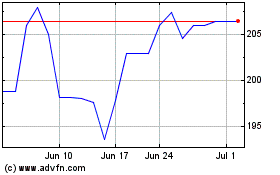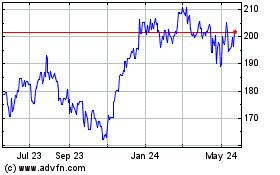London Stock Exchange Eyes $15 Billion Bet for Refinitiv--Update
July 27 2019 - 8:44AM
Dow Jones News
By Ben Dummett
London Stock Exchange Group PLC said early Saturday it is in
advanced talks to buy financial-information and terminal business
Refinitiv Holdings Ltd. from a Blackstone Group Inc.-led consortium
for almost $15 billion, in one of the biggest bets yet on data as a
new source of growth for global exchange operators.
Stock-exchange operators face growing pressure on fees they
generate from the buying and selling of stocks amid new competition
and computerized trading. That has historically pushed exchange
businesses to buy up rivals to boost revenue and cut costs. But the
European Union's decision in 2017 to block the LSE's $30 billion
merger plan with Germany's Deutsche Börse AG -- one of several big
exchange deals to be upended in recent years -- shows this
consolidation strategy can be difficult to execute.
The acquisition of Refinitiv is meant to help the LSE meet that
challenge by further expanding its business as a data provider to
investors and companies. Last year, the LSE's information-services
business grew revenue by 9% to GBP841 million ($1.04 billion) from
the year-earlier period, benefiting from strong growth in
subscription-renewal rates and data sales for its
exchange-traded-fund products. That growth rate was more than
double the LSE's more traditional capital-markets business.
Refinitiv, already a supplier of fixed-income data to LSE's
index business, would give the U.K.-based exchange operator access
to its array of data and analytical tools such as the Eikon
financial-data terminal and other products that are used by more
than 40,000 customers, including brokerage firms, institutional
investors, governments and corporations. Refinitiv also operates
the Tradeweb, FXAll and Matching platforms among others that handle
on average daily trading volume of over $400 billion in foreign
exchange and $500 billion in fixed income.
The LSE is negotiating to acquire Refinitiv from Blackstone,
which together with its partners Canada Pension Plan Investment
Board and Singapore's GIC Pte own about 55% of the financial-data
company, and Thomson Reuters Corp., a holder of a 45% stake in the
business. The deal would represent a quick turnaround for
Blackstone, which agreed to acquire control of the business less
than two years ago in a deal that valued the new firm at $20
billion, including debt.
The LSE, with a market value of about $24.5 billion, said
Saturday it expects to value Refinitiv at $27 billion, including
debt, if the acquisition goes ahead. Excluding the data provider's
debt of $12.2 billion at the end of December, the LSE would be
paying about $14.8 billion for the business.
The leverage LSE would take on from the deal is "high but
acceptable," Exane BNP Paribas said in a research note.
The exchange operator cautioned that the talks could still
collapse. But if an agreement is reached, the deal would create a
company with combined annual revenue of more than GBP6 billion,
more than triple the revenue that the exchange operator generated
last year. The LSE also said the deal would generate annual cost
savings exceeding GBP350 million that would be achieved in the five
years after the deal's completion.
Still, the acquisition would represent a risky bet for the LSE's
newly appointed chief executive, David Schwimmer, an ex- Goldman
Sachs Group Inc. banker who has been in the top job for just under
a year. The size alone would dwarf some of the recent data-related
transactions in the exchange space, such as Nasdaq Inc.'s $220
million acquisition earlier this year of Swedish
financial-technology provider Cinnober. The deal would also stand
out among some of the sector's larger transactions including
Intercontinental Exchange Inc.'s $5.2 billion bid for Interactive
Data Corp. in 2015 and the LSE's $2.7 billion purchase in 2014 of
index-service provider Frank Russell Co.
By pursuing Refinitiv, LSE management would likely face a
monthslong regulatory review of the transaction and a complex
integration process as it seeks to achieve the deal's revenue and
cost-cutting benefits. Furthermore, if the deal's benefits fall
short of expectations, it could prove dilutive to shareholders as
the LSE said that it would use stock to help fund the takeover.
The LSE's stock price has surged roughly 42% since the middle of
December, allowing the company to more easily contemplate a stock
deal for Refinitiv. Still, the deal's inherent risk could spur
shareholder opposition if the bet jeopardizes that stock-price
gain.
In a deal with Refinitiv, LSE indicated that it would own about
63% of the enlarged company, which would continue to be based in
London. That is key to U.K. support for the deal since London is
fighting to hold on to its role as a financial center once the
country carries out its divorce from the EU as early as this
October.
Refinitiv's shareholders would own about 37% of the enlarged LSE
and hold less than 30% of the total voting rights.
Write to Ben Dummett at ben.dummett@wsj.com
(END) Dow Jones Newswires
July 27, 2019 09:29 ET (13:29 GMT)
Copyright (c) 2019 Dow Jones & Company, Inc.
Deutsche Boerse Ag Namen... (PK) (USOTC:DBOEF)
Historical Stock Chart
From Oct 2024 to Nov 2024

Deutsche Boerse Ag Namen... (PK) (USOTC:DBOEF)
Historical Stock Chart
From Nov 2023 to Nov 2024


